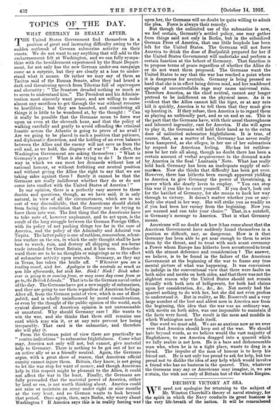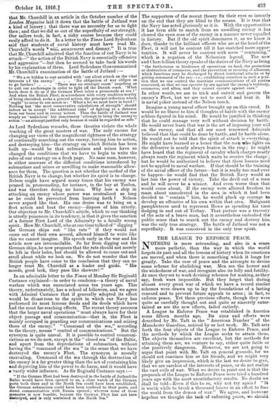DECISIVE VICTORY AT SEA.
WE need not apologize for returning to the subject of Mr. Winston Churchill's theory of naval strategy, for the spirit in which the Navy conducts its great business is the very life-breath of the nation. - It will be remembered that Mr. Churchill in an article in the October number of the London Magazine laid it down that the battle of Jutland was a kind of luxury ; that there was no necessity for us to fight then; and that we did so out of the superfluity of our strength. Our sailors took, in fact, a risky course because they could easily afford to do it. In a letter to the Times Lord Sydenham said that students of naval history must have read Mr. Churchill's words " wir amazement and dismay." It is true that Mr.:Churchill admitted that the function of our Navy is to attack—" the action of the British Navy is essentially offensive and aggressive "—but then he seemed to take back his words by his explanation of them. Lord Sydenham thus summarized Mr. Churchill's examination of the battle of Jutland :— " We a re bidden to rest satisfied with our silent attack on the vital interests of the enemy.' . . . No obligation of war obliges us to go further.' . . . There was no strategic cause' impelling us to quit our anchorages in order to fight off the Danish coast. 'What harm does it do Us if the German Fleet takes a promenade at sea ' And when the British Fleet, in accordance with every tradition worthy of being cherished, seeks a general action, tho principal reflection which ' ought ' to occur to our minds is : What a lot we must have in hand ! ' Nothing but the most conservative calculations of strength' should induce us to accept the additional risks' of fighting at a distance from our bases and in enemy waters. Thus the battle of Jutland was simply an audacious' but unnecessary 'attempt to bring the enemy to action '—an attempt justified only because it could be regarded as sate.'
As Lord Sydenham remarks, these theories violate the whole teaching of the great masters of war. The only excuse for changing our views of the magnificent rightness of the strategy of continually searching out the enemy, forcing him to action, and destroying him—the strategy on which Britain has been built up—would be that submarines and mines have so changed the conditions that we have to begin to write the rules of our strategy on a fresh page. No sane man, however, is either unaware of the different conditions introduced by submarines and mines or unwilling to make reasonable allow- ance for them. The question is not whether the method of the British Navy is to change, but whether its spirit is to change. Nelson might have argued many times that his enemy was penned in, promenading, for instance, in the bay at Toulon, and was therefore doing no harm. Why lose a ship in attacking an enemy whose power was neutralized so long as he could be prevented from bursting forth Nelson never argued like that. His one desire was to bring on a fleet action and beat the enemy—dispose of him utterly. Our objection to Mr. Churchill's article, which to our thinking is utterly poisonous in its tendency, is that it gives the sanction of a former First Lord of the Admiralty to a fatally wrong spirit. How Mr. Churchill, who at one time talked of" digging" the German ships out "like rats" if they would not come out of their own accord, allowed himself to write like this we cannot imagine. His speech early in the war and his article now are irreconcilable. So far from digging out the German ships, he now proposes that the rats should not merely be left in their holes, but should be allowed to come out and stroll about while we look on. We do not wonder that the British people have come to the conclusion that they can no longer trust Mr. Churchill as a leader and guide. "His moods, good lack, they pass like showers I " In an admirable letter to the Times of Monday Sir Reginald Custance explained—in order to condemn—a theory of naval warfare which was enunciated some ten years ago. This theory, unfortunately, has a school of followers, and we agree with Admiral Custance that if generally adopted its effect would be disastrous to the spirit in which our Navy has performed its most famous deeds and its deeds which have had the most far-reaching effects. The recent theory assumes that the larger naval operations "must always have for their object passage and communication—that is, the Fleet is mainly occupied in guardineD our communications and seizing those of the enemy. "Command of the sea," according to the theory, means "control of communications." But the synonym is quite unreal. It is possible to control communi- cations as we do now, except in the " closed sea" of the Baltic, and apart from the depredations of submarines, without having the "command of the sea" in the sense that we have destroyed the enemy's Fleet. The synonym is morally enervating. Command of the sea through the destruction of the enemy is a far greater thing than the act of containing him and depriving him of the power to do harm, and it would have a vastly wider influence. As Sir Reginald Custance says :— " If the German Fleet had been destroyed in the battle of Jutland the Baltic would have been opened to us, a close watch of the German ports both there and in the North Sea could have been established, the German submarines could have been confined to their ports, and direct communication with Russia opened ; whereas none of these measures is now feasible, because the German Fleet has not been 'destroyed, and is only contained in the North Sea." The supporters of the recent theory fix their eyes so intently on the end that they are blind to the means. It is true that the Navy has acted gloriously as it is. With the opportunities it has been able to snatch from an unwilling enemy it has cleared the open seas of the enemy in a manner never equalled in history. But if the old spirit dominates it, as we know it does, thanks to the brilliant officers who are at the head of the Fleet, it will not be content till it has snatched more oppor- tunities. It will never be content with mere "containing," which is a negation of the Nelsonian legend. The new and Churchillian theory speaks of the duties of the Navy as being
"the furtherance or hindrance of operations on land, the protection or destruction of commerce, and the prevention or securing of alliances, which functions may be discharged by direct territorial attacks or by getting command of the sea—i.e., establishing ourselves in such a posi- tion that we can control the maritime communications of all parties concerned, so that we can operate by sea against the enemy's territory, commerce, and allies, and they cannot operate against ours."
In other words, we are to trick and outwit and govern the enemy's Fleet, but we are not to meet it and beat it. It is naval poker instead of the Nelson touch.
Imagine a young naval officer brought up on this creed. It would be no blame to him if thoughts of battle with the enemy seldom figured in his mind. He would be justified in thinking that he could manage very well without decision by battle. He would never learn that war is the art of imposing your will on the enemy, and that all our most renowned Admirals believed that that could be done by battle, and by battle alone. He would not be told that the spirit of attack is everything. He might have learned as a boxer that the man who fights on the defensive is nearly always beaten in the ring ; he might have heard that the regiment of cavalry which charges nearly always routs the regiment which waits to receive the charge ; but he would be authorized to believe that these lessons need not be applied to naval warfare. If that should be the training of the naval officer of the future—but it is really too mad ever to happen—he would find that the British Navy would at last lose the power of victory. Take the devil out of a man and he will never be a winner. And even worse than that would come about. If the enemy were allowed freedom to roam about unmolested in the area in which it had been decided to " contain " him, he would pluck up courage to develop an offensive of his own within that area. Malignant pamphleteers used to represent Howe as spending his time dodging in and out of Torbay. That picture was a travesty of the acts of a brave man, but it nevertheless embodied the public sense that to search out the enemy and destroy him was the only true strategy. The battle of Jutland was not a superfluity. It was conceived in the only true spirit.



































 Previous page
Previous page